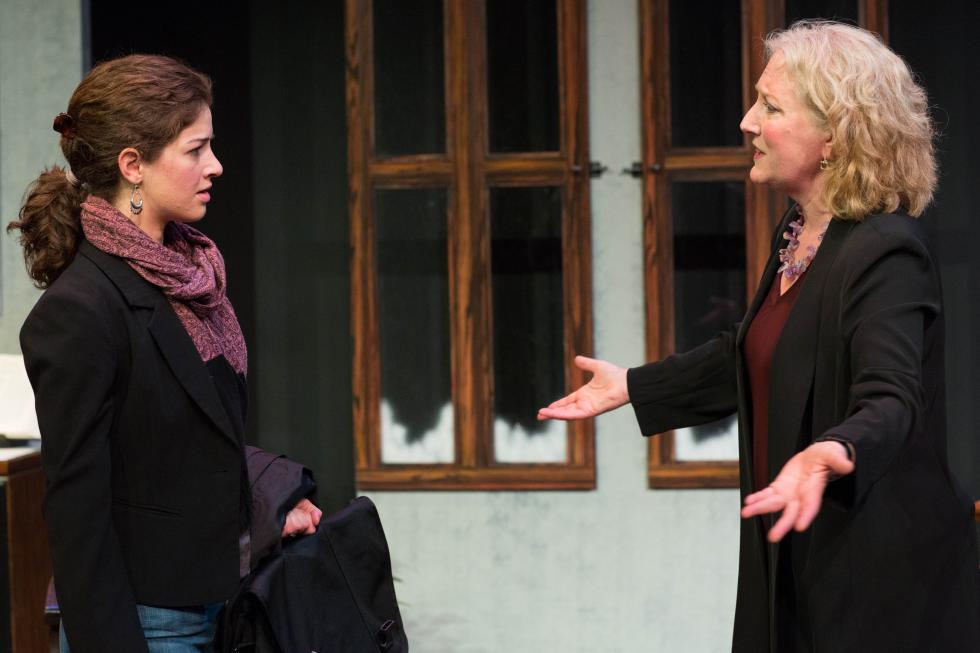Following up on my latest rant about gender equity in area theaters — the lack of it, that is (see “The Distaff Side,” Sept. 24 and Oct. 15, 2014) — I’ve been looking at the upcoming summer season. While the push for gender parity in American theater has gained momentum in recent years, surveys of women’s representation in regional theaters and on Broadway continue to show a sharp dis-parity — though the heap of Tonys bestowed on Fun Home this month might help to budge things.
Around here, anyway, it looks like theaters are finally getting the message. More than two-thirds of the nearly 50 productions in Valley and Berkshire summer theaters this year are written or directed by women, or are centrally about women (as opposed to shared billings like Romeo and Juliet).
Using those three qualities (with a nod to the Bechdel Test, named for Fun Home‘s Alison Bechdel’s criteria for judging women’s representation in movies) I’ve applied a test of my own to the lineups in nine summer theaters: the ratio between each company’s total productions and how many female playwrights, directors and/or central characters there are.
The season is already underway at a couple of theaters. Shakespeare & Company scores a triple crown with The How and the Why, written and directed by women and with an all-female cast. Butler, at Barrington Stage, is ironically an all-male triple whammy — playwright, director, and cast. (But note that we’re not judging individual productions here, but looking at ratios across each company’s season.)
Top marks go to Northampton’s New Century Theatre, with a ratio of 11:5 — 11 “checks” in five productions. Programming a complete season of women playwrights for its 25th anniversary gives the company a head start, plus three of those shows are directed by women and three revolve around female leads: Lillian Hellman’s classic drama The Little Foxes, a family drama with a Southern matriarch at its center; Luna Gale, by Rebecca Gilman, in which a harried social worker confronts issues of child abuse and drug addiction; and a children’s-theater adaption of Barbara Park’s Junie B. Jones series.
Shakespeare & Company, in Lenox, earns a 10:7 ratio, as two of the three namesake plays are woman-directed and all four non-Shakespeareans are written by women. Two of those are directed by women and two have female leads: Sarah Treem’s The How and the Why, about a college professor and her ambitious protégée, and Jane Anderson’s The Mother of the Maid, in which a long-suffering mama strives to understand her unruly daughter, Joan of Arc.
In Hampshire Shakespeare Company’s 3:3 season, both the mainstage and Young Company versions of Romeo and Juliet are directed by women. The third production, The Merry Wives of Windsor, is Shakespeare’s only play in which women have the title roles and the primary action all to themselves.
Silverthorne Theatre Company, now based at Greenfield Community College, held a new-play competition this year and premieres the winning script next month. Aiden’s Gift, by Elizabeth Orndorff, follows the quest of a young monk for purpose and redemption. In addition, all three summer productions are woman-directed, for a score of 4:3.
Chester Theatre Company claims a triple crown with Memory House, a mother/daughter comedy written by Kathleen Tolan and directed by Sheila Siragusa. The troupe’s 4:4 season also features Irish playwright Deirdre Kinahan’s Halcyon Days, though the opening show is another all-male triple whammy — The Gospel According to Thomas Jefferson, Charles Dickens and Count Leo Tolstoy: Discord.
The ratio for Amherst’s Ko Festival of Performance is a little tricky to figure, since four of the six productions are one-woman shows performed by their authors (directors uncredited). But let’s give two points each for Judith Sloan’s Crossing the Blvd, a multi-character follow-up to last summer’s Yo Miss!; Nadia P. Manzoor’s Burq Off!, about a modern Muslim’s dilemma between “a burqa and a bikini”; and local storyteller Onawumi Jean Moss’s exploration of her Afrocentric identity, Seriously … What Did You Call Me?, for a cumulative score of 6:6.
Berkshire Theatre Group’s six main productions include two three-pointers: Suzanne Heathcote’s I Saw My Neighbor on the Train and I Didn’t Even Smile, directed by Jackson Gay, involving three generations of women; and Eve Merriam’s The Club, a “musical diversion” that employs an all-female cast to skewer condescending patriarchy in an Edwardian men’s club. There’s also Bells Are Ringing, the musical about a young woman working for a woman-owned phone-answering service, and one more female director, Karen Allen, helming Frankie and Johnny in the Claire de Lune, for a net 8:6 ratio.
Williamstown Theatre Festival’s 6:8 season offers two plays written and directed by women, including Carey Perloff’s Kinship, about power relationships at work and at home, and Michaela Coel’s one-woman Chewing Gum Dreams, half of a double bill from British playwrights. There’s also Paradise Blue, by Dominique Morisseau, a bebop-era drama of dreams, memories and jazz; and Off the Main Road, the posthumous world premiere of a long-lost drama by William Inge, exploring mother/daughter relations.
Bookending Barrington Stage Company’s all-male kickoff, the Pittsfield troupe’s season closes with a triple-winner, Engagements, written by Lucy Teitler and directed by Louisa Proske, about a young unmarried woman going the rounds of her friends’ engagement parties. Four more woman-directed productions make an overall 7:7.
Bottom line: Of the 49 productions surveyed, 35 fulfil at least one of our criteria and 16 have more than one, for a cumulative ratio of 58:49. Women wrote 21 of the plays and directed 23 of them — getting close to 50/50 parity. Only 15 focus primarily on female characters, but that’s not counting the shared-lead plays with juicy roles for women. That said, a further, and crucial, test of parity is the relative number of female to male characters in a given play. I’ll be making note of those as the summer goes along. Stay tuned.
Chris Rohmann is at StageStruck@crocker.com and valleyadvocate.com/author/chris-rohmann.




